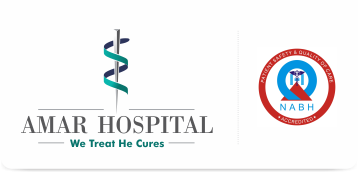Hypertension, commonly known as high blood pressure, is a prevalent health condition affecting millions of individuals worldwide. It is a chronic medical condition characterized by elevated blood pressure levels in the arteries, which can lead to various complications if left untreated. This article will explore effective strategies recommended by specialists for the hypertension prevention and control.
At Amar Hospital renowned hypertension specialist in Punjab, dedicated to helping patients manage their blood pressure effectively.
Importance of Prevention and Control
Health implications
Hypertension is a significant risk factor for cardiovascular diseases, including heart attacks, strokes, and heart failure. It can also lead to damage in vital organs like the kidneys and eyes. By preventing and controlling hypertension, individuals can significantly reduce the risk of developing these severe health complications.
If you or a loved one are struggling with hypertension, seek the advice of the best hypertension specialist in Punjab, for accurate diagnosis and treatment at Amar Hospital.
Cost burden
Uncontrolled hypertension places a considerable economic burden on healthcare systems and individuals. The costs associated with hospitalizations, medications, and long-term management of related complications can be substantial. Implementing preventive measures and effective management strategies can alleviate this burden and improve overall healthcare outcomes.
Lifestyle Modifications
Adopting a healthy lifestyle is fundamental in preventing and managing hypertension. The following lifestyle modifications are recommended:
Healthy diet
A balanced diet rich in fruits, vegetables, whole grains, lean proteins, and low-fat dairy products can help maintain healthy blood pressure levels. Limiting sodium intake and avoiding processed foods high in salt is particularly important. Additionally, reducing saturated and trans fats, cholesterol, and refined sugars can contribute to overall cardiovascular health.
Regular physical activity
Engaging in regular exercise, such as brisk walking, swimming, cycling, or aerobic activities, can help lower blood pressure levels. Aim for 75 minutes of strenuous activity or at least 150 minutes of moderate exercise every week. Physical activity also aids in weight management and improves overall cardiovascular fitness.
Weight management
Maintaining a healthy weight through a combination of regular exercise and a balanced diet is crucial in preventing and controlling hypertension. Losing excess weight can significantly reduce blood pressure levels and lower the risk of developing cardiovascular complications.
Limiting alcohol consumption
Excessive alcohol consumption can raise blood pressure and damage the heart and liver. It is advisable to limit alcohol intake to moderate levels, which is defined as up to one drink per day for women and up to two drinks per day for men.
Smoking cessation
Smoking and exposure to secondhand smoke can increase the risk of developing hypertension and cardiovascular diseases. Quitting smoking and avoiding exposure to tobacco smoke is vital for both primary and secondary prevention of hypertension.
Stress Reduction Techniques
Chronic stress can contribute to hypertension and other cardiovascular problems. Implementing stress reduction techniques can have a positive impact on blood pressure levels. The following techniques are recommended:
Relaxation exercises
Practicing relaxation exercises such as deep breathing, progressive muscle relaxation, and guided imagery can help reduce stress and promote a sense of calmness.
Mindfulness and meditation
Mindfulness techniques and meditation can improve emotional well-being, reduce stress, and positively influence blood pressure levels. Mindfulness-based stress reduction programs have shown promising results in managing hypertension.
Engaging in hobbies and recreational activities
Participating in activities that bring joy and relaxation, such as hobbies, sports, or spending time with loved ones, can help alleviate stress and contribute to overall well-being.
Medication Management
In cases where lifestyle modifications alone are insufficient, medication may be prescribed by a healthcare professional to control hypertension effectively. The following aspects are crucial for medication management:
Prescribed antihypertensive drugs
Different classes of antihypertensive medications may be prescribed, including diuretics, beta-blockers, ACE inhibitors, ARBs, and calcium channel blockers. The choice of medication depends on individual patient factors and specific clinical considerations.
Compliance with medication regimen
It is essential to take prescribed medications consistently and as directed by the healthcare provider. Skipping doses or stopping medication abruptly can lead to uncontrolled blood pressure levels and potential health complications.
Regular check-ups and monitoring
Regular follow-up appointments with the healthcare provider are necessary to monitor blood pressure levels, assess the effectiveness of the prescribed medication, and make any necessary adjustments to the treatment plan.
Health Education and Awareness
Public education and awareness campaigns play a crucial role in preventing and controlling hypertension. The following strategies can help disseminate information and promote healthy behaviors:
Public campaigns
Government bodies, healthcare organizations, and non-profit entities can initiate public campaigns to raise awareness about hypertension, its risk factors, and the importance of prevention and control. These campaigns can include advertisements, social media outreach, and community events.
Community outreach programs
Engaging with local communities through workshops, seminars, and health fairs can provide valuable information about hypertension prevention and control. These programs can also offer free blood pressure screenings and promote access to healthcare resources.
Patient education materials
Developing informative brochures, pamphlets, and online resources can empower individuals with knowledge about hypertension and guide them toward healthy lifestyle choices and appropriate management strategies.
Collaborative Care
Successful management of hypertension often requires collaboration between healthcare professionals, patients, and their support networks. The following elements contribute to effective collaborative care:
Involvement of healthcare professionals
Regular consultations with physicians, nurses, and other healthcare providers are essential for the comprehensive management of hypertension. They can provide guidance, monitor progress, and adjust treatment plans based on individual needs.
Support from family and friends
Having a supportive network of family and friends can greatly assist individuals in adhering to lifestyle modifications and medication regimens. Encouragement, understanding, and active participation in healthy behaviors can contribute to successful hypertension management.
Utilizing healthcare resources
Taking advantage of available healthcare resources, such as support groups, educational programs, and telemedicine services, can further enhance hypertension prevention and control. These resources provide valuable information, guidance, and support throughout the journey.
Conclusion
Hypertension is a prevalent health condition with significant implications for individuals and healthcare systems. By implementing a combination of lifestyle modifications, stress reduction techniques, medication management, health education, and collaborative care, hypertension can be effectively prevented and controlled. It is important for individuals to take proactive steps toward maintaining healthy blood pressure levels to reduce the risk of associated complications.


